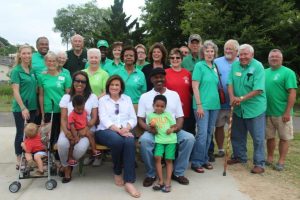A Tribute to John Lee Turner, Jr. — “Pecan John”
Farmer, Educator, Innovator, Philosopher, Peacemaker

John Turner, Jr.
Oftentimes, our pecan pioneers and heroes labor in relative obscurity. John Lee Turner, Jr. was such a man. Dan York, an original APC Council Member, introduced me to John in 2015.
We asked him to testify as a native pecan grower from Arkansas during the Pecan Federal Marketing Order hearings in Dallas. He graciously accepted and subsequently gave one of the most compelling arguments in favor of the Order. His honest, down-home style before the Administrative Law Judge Clay Guthridge convinced all of us listening that John knew pecans. The industry legal counsels, Paul Quiros and Dwight Davis, had this to say about John and his testimony, “John Turner was one of our most valuable witnesses during the American Pecan Council’s approval process. His combination of scientific training and life experiences in the pecan industry gave credibility to our presentation of industry data. Additionally, his down-home delivery and stories of how pecans were central to his community in Miller County, Arkansas, put a very human face on the pecan industry that mere facts and figures could not convey. And to top it all off—he was a pleasure to be with.”
John was appointed to the original American Pecan Promotion Board by Agriculture Secretary Tom Vilsack in 2021. However, his pecan history dates to his childhood as a youngster growing up on a farm on Sims Island, 20 miles east of Texarkana, Arkansas. John’s wide-ranging education began in a small, three-room schoolhouse, Harvey Elementary. Upon graduating from high school, he furthered his education by earning a Bachelor of Science degree from the University of Arkansas, Pine Bluff, and then a Master’s degree from U of A, Fayetteville. His love of horticulture and pecans took him to Texas A&M University to study pecan production further. Most importantly, this extensive learning was put into practice on his farm in Miller County, “growing some of the best quality native pecans in the region” as opined by Dan York at his York Pecan Company shelling plant in Foreman, Arkansas. His thirst for education did not stop there; he passed it on to others as an employee of the University of Arkansas Division of Agriculture in Miller County and as a teacher of vocational agriculture in West Helena for 14 years. Through all those years, he earned the reputation and nickname “Pecan John.” Giving back to the community was a passion for John. Among his many contributions are:
- Organizing the Red Dirt Master Gardeners
- Organizing the 4-H Back to Nature program for disadvantaged youth
- Organizing the 4-H Fishing Derby
- Organizing Train the Trainer Leadership Program, specializing in Parliamentary Procedure, By-Laws Writing, and Effective Meeting Training
John Turner was a walking wiseman with colloquial and instructive quotes; one that I still remember from his testimony eight years ago: “You can’t let the hungry boy carry the lunch bucket.” Another one: “You can’t run with the rabbits and hunt with the hunters.”

John Turner and his family sit on the bench that was dedicated to him by the local Master Gardeners in Texarkana, during the Gateway Farmers Market on Jefferson. (Photo by Miller County; Arkansas Extension)
Some of the most honest and treasured words come from John’s own testimony in July 2015 at the hearing in Dallas. Attempting to add to or take away from such honest language would be an injustice to “Pecan John.”
Enjoy his own words:
“I live in Texarkana, Arkansas. I am the heir and operator of the Nash-Turner Ranch. In the early 1900s, my maternal Grandfather Nash, and my paternal Grandfather Turner purchased their farms next door to each other. Today, the Nash-Turner Ranch has three pecan farms in Miller County, Arkansas. We have over 250 acres of pecans in production. Last year, we produced 80,000 pounds of pecans. On our farm, we grow 97 percent natives and 3 percent improved variety pecans. Nash-Turner Ranch has less than $750,000 in annual gross revenue from pecans, and therefore, under the Small Business Administration guidelines, we are classified as a small business.
When I finished college, I stayed out of school for one year; then I got a call to be an ag teacher, West Helena, Arkansas. I stayed there 14 years, and I was like the old cow when the gate opened. The first opportunity I got, I quit and moved back to Miller County because of our pecan farms. I worked there as an extension agent for 26 years, over 20 years directly on pecans. Through those years, I worked with planting pecans in place with nuts, planting seedling nuts, grafting, pruning, training, fertilizing; pest control. At present, I’m working with crowded native orchards.
When my siblings would get ready to go to college, my mother would tell us all the pecans we pick up, we’re going to give it to them to go to college. It was eight of us at that particular time. All went to college, but all didn’t finish. But pecans helped push us through college. When I got married, my wife, she moved in with my parents, and she picked up pecans.
Matter of fact, we had a Hatfield and McCoy situation, and pecans settled that. I was a very young man, and we would pick up all our pecans because we were pecan rustlers. We didn’t waste any time. We had ice, snow, it didn’t make any difference. We could go get those pecans. I’ll say the other side of the fence was the Hatfields, and we were the McCoys. My parents and those older people, they never got along. They would fight. They would cut fences, shoot horses, cows, all type of things, but I was never involved. We picked up all our pecans, so I got on my old bicycle, rode it over there, and asked the guy, “Could I pick up some of your pecans?” I was about maybe this tall—[gesturing about 3 1/2 feet].
He said, “Yes, boy.” I said, “Give me two sacks.” He looked at me and gave me two sacks. He said when I left, his wife told him, “He’s going to steal a sack full.” That evening, I came up to his house and said, “Did you go drive over there and pick up my pecans? I had two full sacks standing upside the tree. He said, “Boy, how’d you pick up all those pecans? How did you do it?” I said, “I just picked them up.” I said, “May I bring my siblings tomorrow?” I said sisters and brothers. He said, “Yes.” I brought the army. We cleaned that place out. We picked up so many he had to give us half of them. He couldn’t pay us, so he brought us home. That’s when he met my dad on good terms. They started talking. When they both passed away—my dad lived almost 104 years—they were friends, so pecans settled that dispute.”
John was a farmer, an educator, an innovator, a philosopher, and a peacemaker—always giving credit to the pecan. I think I know where Pecan John is now, and I’ll bet heaven has pecan trees, too.
Sources:
- Farmer of the Month – November 2015 by Jennifer Caraway, County Extension Agent, The Cooperative Extension Service, University of Arkansas Division of Agriculture
- USDA Public Hearing, Proposed Marketing Order, July 24, 2015, Dallas, Texas

